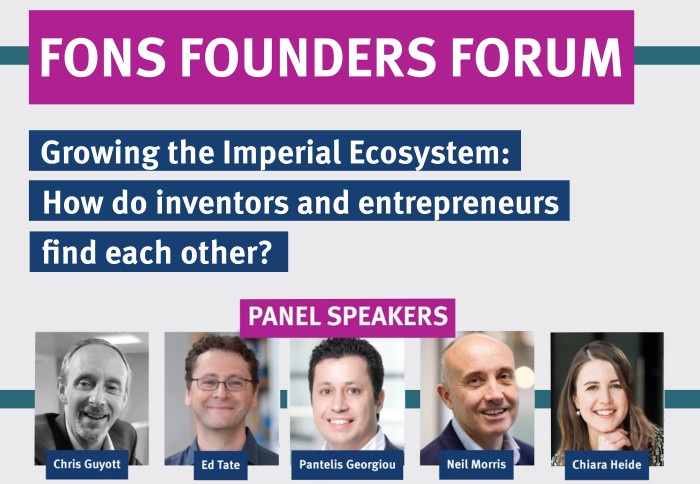Scientists-turned-entrepreneurs reveal how they pick their business partners
by Jacklin Kwan

At the FoNS Founders Forum, researchers and entrepreneurs shared their experiences in vetting business partners when founding their own startups.
In a panel discussion hosted by the Faculty of Natural Sciences (FoNS), academics and entrepreneurs revealed the signs they look out for vetting business partners in the early days of founding their startup.
The FoNS Founders Forum (FFF), organised by the Faculty’s Industry Partnerships and Commercialisation (IPC) team and Professor David Klug, Associate Dean for Enterprise, gathered a panel of industry experts and startup founders to share their experiences as scientists-turned-entrepreneurs, specifically highlighting how academics found business professionals and vice versa.
The panelists discussed what they considered to be vital ingredients for a fruitful business partnership as founders of early-stage startups.
There must be trust and respect
“I think the single most important thing is that you have to truly believe you can get along together,” says Neil Morris, a chemical engineer who now serves as the first Chief Executive Officer of the Faraday Institution, a UK government funded organisation for battery research.
After 35 years of experience in international operations, business and commercialisation in the energy sector, Morris said that startup founders needed to be prepared to have “robust conversations” with their business partners: “And that’s not possible if you fundamentally don’t like and respect each other.”
To find the right fit, the panel compared the process to dating. Morris says: “You can’t rush into the arrangement – use them as an advisor in some shape or form before you actually move into a partnership.”
Professor Pantelis Georgiou, a lecturer at the Department of Electrical and Electronic Engineering at Imperial, co-founded his own startup in 2020 – ProtonDX – which develops rapid diagnostics using Lab-on-Chip technology.
The green flag is when you feel that your partner’s goals and visions align with yours as founders. Professor Pantelis Georgiou Department of Electrical and Electronic Engineering
Professor Georgiou advises to choose good business partners such that it creates a positive synergy with the scientists in the company to deliver its vision “The green flag is when you feel that your partner’s goals and visions align with yours as founders.”
“The academic and science side needs to be complemented by the business and regulatory side,” he says, “When academics feel like their invention is their baby, they want to be involved so it’s all about finding the right balance.”
They need to give you something you lack
Panelist Professor Ed Tate, the academic founder of Myricx Pharma, a university spinout developing novel drugs and treatments, emphasised the need for academics to be aware of their own weaknesses.
“As an academic, you probably don’t ever go into drug development. In fact, the more successful you are, the quicker you probably will see yourself going into an advisory role, especially in pharmaceuticals,” he says.
Professor Tate added that, in this context, finding a business partner who is able to contribute missing skills and expertise is necessary.

Morris agreed, saying that academics tended to do well when selling their idea to individuals from similar backgrounds, but could be ill-equipped to deal with the concerns of those more directly involved in funding decision-making.
Chris Guyott, an alumnus of Imperial who has over 30 years of experience in commercial consultancy, cautioned against over-specialising early on. He says that – even though academic founders may feel inexperienced when dealing with business ventures – they should remain actively involved.
“In the very early days of a startup, there are going to be many people doing lots of different things and putting on different hats,” Guyott says, “When you’re seeking funding, I would personally look for a founder where they have a good understanding of how they can actually go out and sell their idea.”
The panel warned against business partners that, in fact, had nothing to contribute at all. Dr Chiara Heide, founder of a biotech startup developing microbiota solutions for female urinary health called P.Happi, says that the entrepreneurial space often attracts people who over-extended themselves.
She says, “I think there are people who just want to get a lot of different roles and names on their LinkedIn profiles. I would be very careful about people who ask for equity and compensation too early.”
Building a network for academics and entrepreneurs
The panel discussion was followed by a networking event – the first one held in-person after the pandemic. “What we want to do is add value to the academics who are just starting out in company creation in FoNS”, says Dr Luis Gomez Sarosi, who helped organise the event.
“The networking component opens a space for informal conversation and create an environment of collaboration where you can create new connections,” he says.

By providing an informal space open to all academic staff, the IPC team in FoNS hopes to create a supportive community of academic entrepreneurs in FoNS that are able to provide guidance, experience and advice to one another.
Article text (excluding photos or graphics) © Imperial College London.
Photos and graphics subject to third party copyright used with permission or © Imperial College London.
Reporter
Jacklin Kwan
Faculty of Natural Sciences